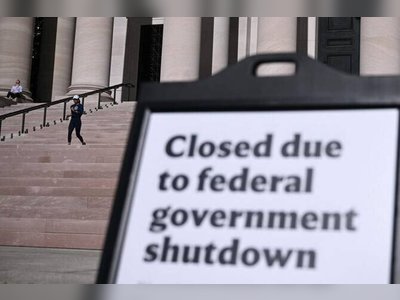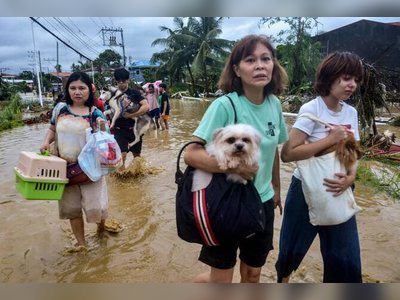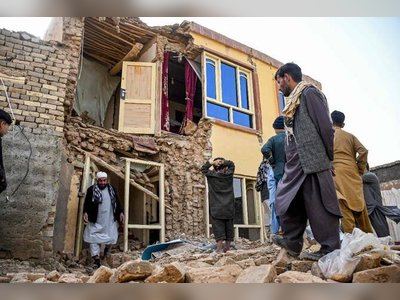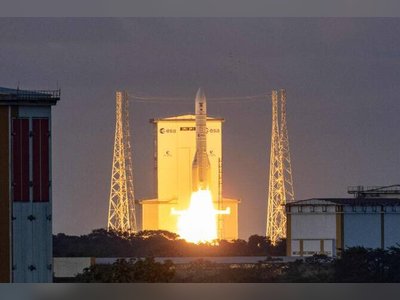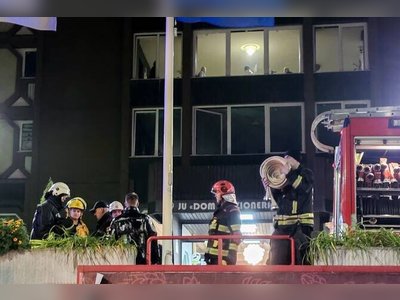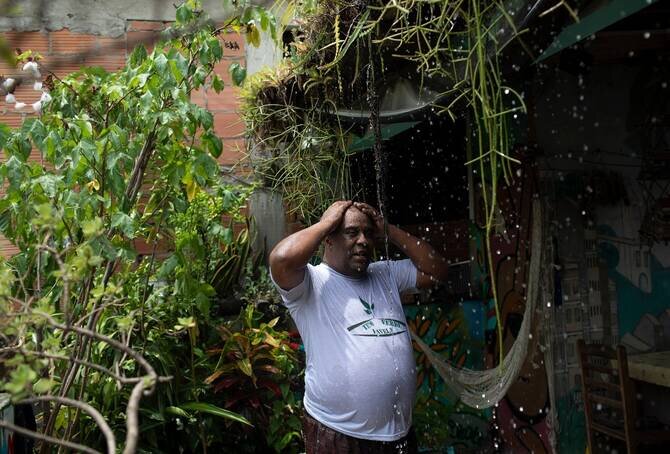
Climate Talks in Brazil: A Stark Reality of Poverty's Impact
As world leaders gather in Belem, host to this year's COP27 climate talks, the stark reality of poverty's impact on vulnerable communities becomes apparent.
In the Arara neighborhood of northern Rio de Janeiro, Luis Cassiano has been witnessing the intensification of heat waves over the past few decades.
He is not alone in his concern; as summer temperatures soar, the frequency and severity of heatwaves are becoming more pronounced in low-income areas such as his own.
The inability to afford air conditioning due to regular power outages further exacerbates the plight of residents.
Cassiano's solution, a green roof that can reduce the temperature by up to 15 degrees Celsius compared to neighboring houses, offers some relief but not enough.
The climate talks in Brazil have brought into sharp focus the disproportionate impact of climate change on poor communities.
Residents like Cassiano face unique vulnerabilities as they are often unable to afford basic protections against climate hazards such as extreme heat and storms.
The challenges these communities face include a lack of resources to adapt to the impacts of climate change, which range from more frequent natural disasters to reduced agricultural yields.
In wealthier countries, too, the poor bear the brunt of climate-related adversities.
According to the United Nations Development Programme (UNDP), 82% of people living in poverty worldwide are exposed to at least one of four climate hazards: high heat, droughts, floods, and air pollution.
The socioeconomic factors that contribute to this disparity include a lack of financial resources to relocate from hazard-prone areas or to rebuild after disasters strike.
Additionally, the impacts on livelihoods can be devastating without financial savings or social mobility.
The effects of climate change are acutely felt in agricultural productivity, with poorer countries expected to experience more significant drops in farm yields compared to their wealthier counterparts.
Africa, home to over 500 million people living in poverty, is particularly concerning as many depend on farming for their livelihoods.
The potential benefits of technology in mitigating these impacts are recognized but often unaffordable for small agricultural producers, most of whom reside in low- or middle-income countries.
The choice of Belem, a relatively impoverished city located on the edge of the Amazon, to host COP27 is intended to highlight the reality faced by millions worldwide.
Despite challenges such as limited accommodation for negotiators, this decision seeks to ground the climate negotiations in the everyday struggles of those most affected by environmental degradation.
However, some experts remain skeptical about the potential outcomes from these talks, calling for clearer directives on immediate action needed.
There is also a debate around the prioritization of efforts, with figures indicating stagnant poverty rates globally and calls from philanthropists like Bill Gates to focus on reducing human suffering rather than solely on emissions reduction.
Critics argue against framing climate change as a future concern or a problem for affluent nations alone.
Instead, they advocate for integrating climate action into broader development strategies that address the pressing needs of vulnerable communities.
He is not alone in his concern; as summer temperatures soar, the frequency and severity of heatwaves are becoming more pronounced in low-income areas such as his own.
The inability to afford air conditioning due to regular power outages further exacerbates the plight of residents.
Cassiano's solution, a green roof that can reduce the temperature by up to 15 degrees Celsius compared to neighboring houses, offers some relief but not enough.
The climate talks in Brazil have brought into sharp focus the disproportionate impact of climate change on poor communities.
Residents like Cassiano face unique vulnerabilities as they are often unable to afford basic protections against climate hazards such as extreme heat and storms.
The challenges these communities face include a lack of resources to adapt to the impacts of climate change, which range from more frequent natural disasters to reduced agricultural yields.
In wealthier countries, too, the poor bear the brunt of climate-related adversities.
According to the United Nations Development Programme (UNDP), 82% of people living in poverty worldwide are exposed to at least one of four climate hazards: high heat, droughts, floods, and air pollution.
The socioeconomic factors that contribute to this disparity include a lack of financial resources to relocate from hazard-prone areas or to rebuild after disasters strike.
Additionally, the impacts on livelihoods can be devastating without financial savings or social mobility.
The effects of climate change are acutely felt in agricultural productivity, with poorer countries expected to experience more significant drops in farm yields compared to their wealthier counterparts.
Africa, home to over 500 million people living in poverty, is particularly concerning as many depend on farming for their livelihoods.
The potential benefits of technology in mitigating these impacts are recognized but often unaffordable for small agricultural producers, most of whom reside in low- or middle-income countries.
The choice of Belem, a relatively impoverished city located on the edge of the Amazon, to host COP27 is intended to highlight the reality faced by millions worldwide.
Despite challenges such as limited accommodation for negotiators, this decision seeks to ground the climate negotiations in the everyday struggles of those most affected by environmental degradation.
However, some experts remain skeptical about the potential outcomes from these talks, calling for clearer directives on immediate action needed.
There is also a debate around the prioritization of efforts, with figures indicating stagnant poverty rates globally and calls from philanthropists like Bill Gates to focus on reducing human suffering rather than solely on emissions reduction.
Critics argue against framing climate change as a future concern or a problem for affluent nations alone.
Instead, they advocate for integrating climate action into broader development strategies that address the pressing needs of vulnerable communities.

